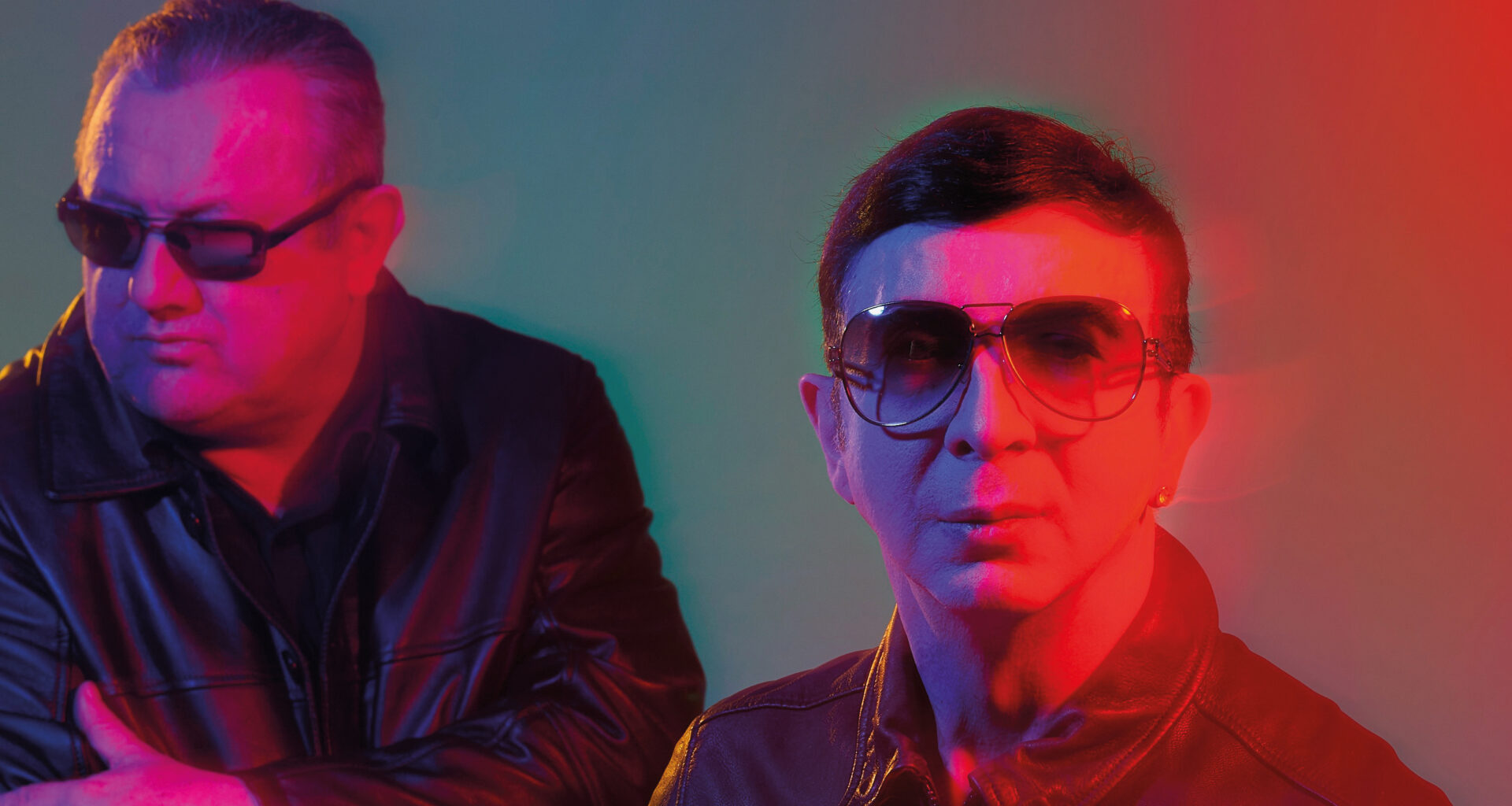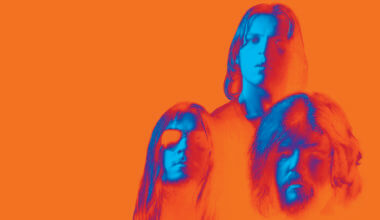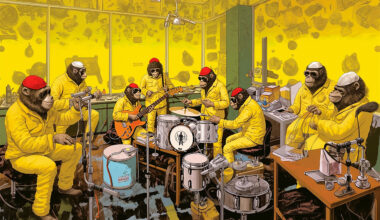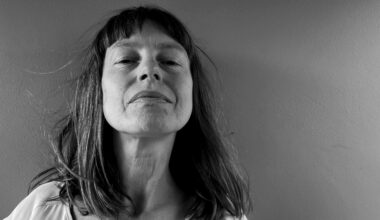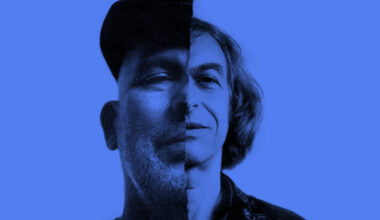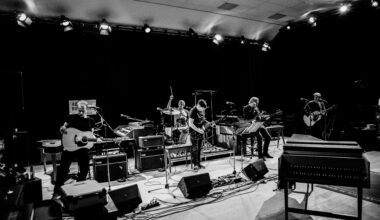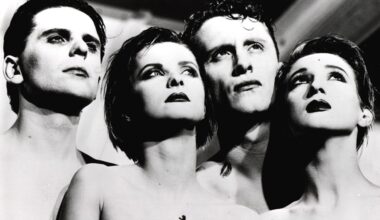On the eve of their very last live show and with a mega 10-cd boxset in the shops, the one and only Dave Ball, Soft Cell’s other half, pulls up a pew and tells us a few tales from along the way…
“I fancied myself as a guitarist, but I always had shit guitars,” says Soft Cell’s Dave Ball, casting back to his 17-year-old self as we settle, mid-week, in the quietest corner of an already quiet Soho boozer, ice-cold cider to hand. “We weren’t a rich family, but when my dad died in 1977 I got £1,000 in his will, so I thought, ‘I’m going to get a really nice Sunburst Fender Telecaster, a big amp and a fuzzbox’.”
Which he duly did.
“The neighbours loved it, I assure you,” he chuckles, Blackpool twang still very much intact, eyes twinkling with the pure mischief of it all. “I quickly got bored with it, though. It wasn’t doing what I wanted it to!”
Guitars, eh? What’s a boy to do?
“I had a summer job in Blackpool as an ice cream man,” he continues. “One day, it was raining and we were in the office and this guy had ‘Autobahn’ on a cassette. I thought, ‘Bloody hell, that’s fantastic’. After that, I wanted a synthesiser and I saw a second-hand Korg 800DV in a music shop for £450. I traded my Telecaster in and that’s how I got my first synth.”
Which, in short, is how it all began. And it ends with one final hurrah later this month, when Marc Almond and Dave Ball take to the stage at London’s O2 Arena for their last-ever live performance as Soft Cell.
“There was no plan for getting Soft Cell back together,” reveals Dave. “As far as I was concerned, Marc had been doing his solo career and I was just doing my own thing, getting on with life…”
But then Dave got a call from Universal Records. Would he, they wondered, be interested in doing a Soft Cell boxset? The label had dipped their toe in the water, doing well with Marc Almond’s impressive 2016 10-disc collection, ‘Trials Of Eyeliner’. The thinking was a Soft Cell set could do even better.
“I asked them if Marc was up for it,” says Dave. “‘Oh, yeah, he’s really enthusiastic about it,’ they said, ‘we’ll have to get you guys back together’. I remember thinking, ‘Well, that’s never going to happen’. We’d not fallen out, but we had lost contact. So when we met up for a chat, it was all pretty tentative. It was at the Connaught Hotel in Mayfair. Very posh. I had some expensive beers and Marc had some expensive cups of tea.”
During the meeting, the pair started talking about doing a live show. They had reformed in 2001 for a string of dates, which in turn led to their well-received fifth album, 2002’s ‘Cruelty Without Beauty’, so it wasn’t the daftest idea. It turned out that Marc was keen. And if Marc was in, so was Dave. It was just a case of where.
“I was like, ‘What about the Royal Albert Hall?’,” chuckles Dave. “And Marc’s manager said, ‘We’ve played there twice’. So it was like, ‘OK, where are you thinking, then?’. The next thing, they’re suggesting the O2. I said, ‘You what? The O2?’. I remember saying to my manger, ‘Are you sure about this?’. He said, ‘As long as we sell 5,000 tickets, we should be alright’…”
And how many tickets have they sold?
“16,000!” laughs Dave.
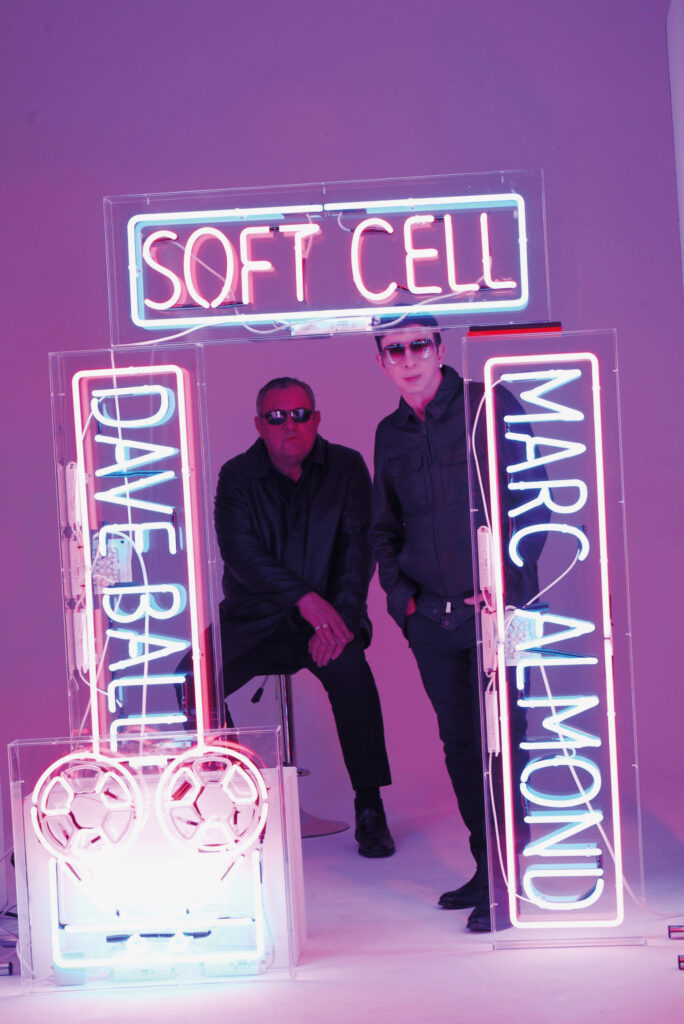
This flurry of activity has also seen the Soft Cell boxset come to fruition. ‘Keychains & Snowstorms’ is a fascinating 10-disc album that collects together 12-inch mixes, B-sides, rarities, alternate versions and radio sessions, as well as early years out-takes and demos, a 1983 live show from LA and, the icing on the cake, a raft of new extended mixes and an hour-long mix called ‘Non-Stop Euphoric Dubbing’. But it doesn’t stop there. Despite the pair playing their last live show, next year will also see an extensive Soft Cell reissue programme, which you’d imagine will keep them busy.
The question is, with so much love in evidence, why have they waited so flipping long?
“It’s quite hard to place a value on yourself, isn’t it?,” says Dave, modestly. “I don’t understand the commercial value of what we do, but obviously it exists… the boxset went to Number One in the pre-sales chart and we’ve sold out the O2, but then we’re going to call it quits?! It’s crazy in a way, isn’t it? If we just did this for another couple of years, I could buy a yacht and sail off.”
For some, Soft Cell are an act whose enormo hit ‘Tainted Love’ trumps everything. Across its 10 discs, ‘Keychains & Snowstorms’ serves as a reminder that they are so much more than a one-track wonder. People forget. Forming in the late 1970s at Leeds Poly, where Marc and Dave both studied art, Soft Cell had a blistering burst of activity between 1981 and 1984, releasing four albums and producing a run of huge hits including ‘Bedsitter’, ‘Say Hello, Wave Goodbye’, ‘Torch’ and ‘What!’. Plus, of course, the worldwide Number One ‘Tainted Love’, which also happened to be the best-selling single in the UK in 1981.
‘Keychains & Snowstorms’ features ‘Tainted Love’ three times. There’s the epic 12-inch ‘Tainted Love’/’Where Did Our Love Go’ segue version and the ‘Tainted Dub’ remix, while the third appearance is a demo recorded with Mute Records boss Daniel Miller, the route to which is, by any tangled web standards, pretty incredible. Let’s rewind to Leeds Poly, where there was another student on the art course, a couple of years above Marc and Dave, who inadvertently gave the fledgling Soft Cell a leg-up.
“Me and Frank never got on that well, but he was one of the reasons I got so into synthesisers,” says Dave.
“We had this sort of music studio at the college and Frank used to muck about in there. He was more performance-based at that time. Very theatrical.”
The “Frank” in question was none other that Fad Gadget man Frank Tovey.
“I’d gone into the studio to do something with my minimal bits and bobs, I think I had a stylophone and a guitar, and there was a cheap compact electric piano lying there,” continues Dave. “I thought, ‘Hm, I’ll have a go with this’. So I put it through a flanger, just messing about, playing stuff and recording it and then overdubbing it.
Anyway, I did a couple of tracks. When Frank overheard what I was doing, he was going, ‘How did you make those sounds? What instrument did you use?’. I said, ‘Oh, I just used that keyboard’, and he said, ‘That’s my keyboard! You didn’t ask me!’. We never saw eye to eye after that, but it was thanks to Frank Tovey that I really got into synthesisers.”
Marc, however, became friends with Tovey and asked him to pass on a couple of Soft Cell demo tapes to Daniel Miller, who was just starting Mute at the time.
“Apparently Daniel said it didn’t ring his bell or something, that it wasn’t developed enough,” says Dave.
No matter. It was enough to get them on Miller’s radar and their paths crossed again when Soft Cell signed to Stevo’s Some Bizarre label and Miller was called in to produce ‘Memorabilia’ for their 1981 debut single.
During those sessions, Marc and Dave also demoed ‘Tainted Love’ with Miller at the controls, and it sounds radically different to the version we’re used to hearing. Very rigid, with a strict Teutonic four/four, it has little of the swing of the Mike Thorne-produced Number One single.
“Daniel saw the future before a lot of people,” notes Dave. “He always said he didn’t think of himself as a producer, he just knew more than other people at that time. He was always very techno and very sequencer-driven, and that didn’t suit us. If you listen to the sounds on those early demos and then listen to Depeche Mode’s ‘Speak & Spell’, you can hear that he used the same kit.
“Those sessions were our first foray into the world of studios. It was a 16-track studio called Stage One, up in Forest Gate in east London. It was the first time we’d seen a proper mixing desk. It was like, ‘Wow, so you can have the bass drum on that track and then the snare drum on that one?’, because we’d just been bouncing stuff down on Revoxes. It was a real Wizard of Oz moment for us.”
Over a very pleasant afternoon, with only the occasional nudge to steer the chat back to dry land when he loses a train of thought or wanders off on a wild digression, Dave Ball is excellent company. While Soft Cell have always clearly been the sum of its parts, does he think he got the credit he deserves?
“Marc was the front man,” he says. “I was actually always happy being in the background, because while I like to be in control, I don’t necessarily like to be in the spotlight. Marc is crowd control and I’m sound control. It’s very symbiotic, our relationship.”
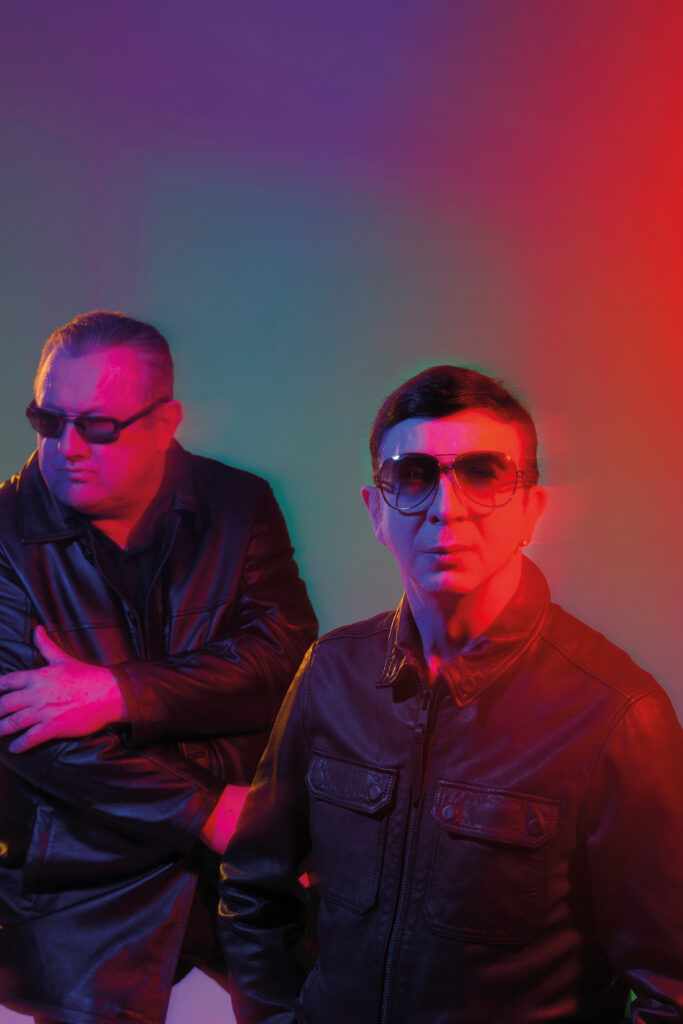
That crowd control would rather quickly hit fever pitch when Soft Cell went overground, almost overnight.
“Marc and I lived in the same building when we were in Leeds, a housing association place,” says Dave.
“There was a payphone in the hall, which is where we got the news that we were going on ‘Top Of The Pops’. ‘Tainted Love’ was Number 52 in the charts and we were going on as a new entry. I remember heading down to London and we had to go to Clapham to join the Musicians Union, but I couldn’t join as a synth player because they didn’t recognise the synth as an instrument. I thought, ‘What did Brian Eno and Kraftwerk and Giorgio Moroder put down as their instrument?’. So anyway, I said bass guitar and piano. Fine.”
Things took a turn for the worse when they arrived at the BBC Television Centre in Shepherd’s Bush and the ‘TOTP’ producers began to lay down the law. Or at least they tried to.
“They said, ‘By the way, we’re going to have to get you a drummer and a bass guitarist,” laughs Dave. “We said, ‘Fuck off’. Ha! And then they told Marc he couldn’t wear bangles and he had to tone down the eyeliner. Marc was like, ‘Go fuck yourselves’. So we do ‘Top Of The Pops’, no drummer, no bass guitarist, Marc with more eyeliner than normal, bangles, and the BBC switchboard was jammed with complaints! The next week, the sales of eyeliner and bangles went through the roof. Every kid was wearing eyeliner and bangles!”
It sounds ridiculous now, but for many of those kids watching, growing up in front of ‘Top Of The Pops’ in the early 1980s, that Soft Cell appearance was their very own Bowie/Ronson moment. It was a real showstopper. That someone like Marc even existed, let alone was on the telly, was all the excuse they needed.
“Even though Bowie had done that before, and with all the glam rock, Alice Cooper and all the rest of them dressing up like women, wearing loads of make-up and having long hair, there was still so much homophobia,” says Dave. “Marc wasn’t even allowed to say he was gay. They used to have pieces in magazines where he had various girlfriends. It was ridiculous.”
One such “girlfriend” was the legendary Cindy Ecstasy, so named because, well…
“I’d been to New York once before, with my mum and my sister in 1978 after my dad had died, and I loved it,” says Dave. “But the next time I went, it was a totally different thing…”
Heading to the Big Apple to record with Mike Thorne, who would become Soft Cell’s producer of choice over the next few years, Marc and Dave didn’t hang about. This debut recording trip saw them party like loons.
“It was the first time that Marc had been to New York,” explains Dave. “Stevo came along too and that’s when we met Cindy. Marc and Stevo came back one night saying they’d found this amazing new drug. Stevo showed me a little white capsule and said, ‘You know how much that is? $6 each. They’re legal as well!’. They were legal too. Ecstasy was completely legal in America at that time.
“Anyway, Stevo said to me, ‘When we go out, try one’. So off we went to Studio 54 or Danceteria or maybe it was this club called Berlin, and I dropped one of these capsules… and it was like, ‘Fucking hell, where do I get more?’. So we got introduced to Cindy, this girl from Brooklyn who seemed to always have a supply of them. She was just a party girl, she never pushed them on anyone. Didn’t have to.
“Oh, one mistake, because we’d got into the coke by this point, we opened one of the capsules up and tried chopping it out and snorting. Big mistake. The coke at that time in New York was incredible, so we were doing E and coke. Oh, and a bit of crystal meth. We did a bit of ketamine too. There were some amazing drugs, but the crystal meth occasionally led to heavier stuff like smack for some people. There was opium as well. And some seriously strong acid. I mean, we did our bit for the pharmaceutical industry, you know. And lived to tell the tale. All the better for it, I think.”
It’s a tale we haven’t even half begun to tell. Until next time…
‘Keychains & Snowstorms’ is out on Universal
